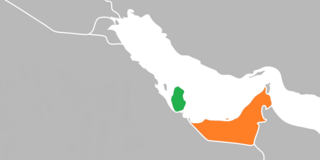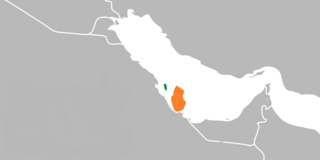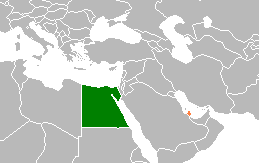| |||||
| Decades: | |||||
|---|---|---|---|---|---|
| See also: | |||||
This is a list of notable events that occurred in 2017 in Qatar .
| |||||
| Decades: | |||||
|---|---|---|---|---|---|
| See also: | |||||
This is a list of notable events that occurred in 2017 in Qatar .
Foreign relations of Qatar is conducted through its Ministry of Foreign Affairs. Arab states were among the first to recognize Qatar, and the country gained admittance to the United Nations and the Arab League after achieving independence in 1971. The country was an early member of OPEC and a founding member of the Gulf Cooperation Council (GCC). Diplomatic missions to Qatar are based in its capital, Doha.

The Cooperation Council for the Arab States of the Gulf, also known as the Gulf Cooperation Council, is a regional, intergovernmental, political, and economic union comprising Bahrain, Kuwait, Oman, Qatar, Saudi Arabia, and the United Arab Emirates. The council's main headquarters is located in Riyadh, the capital of Saudi Arabia. The Charter of the GCC was signed on 25 May 1981, formally establishing the institution.

Sheikh Tamim bin Hamad bin Khalifa Al Thani is Emir of Qatar, reigning since 2013.

Qatar and the United States are strategic allies. Qatar has been designated a major non-NATO ally by the United States.

Qatar and the United Arab Emirates share a naval border and are part of the Arabic-speaking Persian Gulf region. They are both members of the GCC.
Qatar News Agency is a state-run Qatari news agency.

The State of Qatar and the Republic of Turkey established bilateral relations in 1972. There has been ongoing cooperation and dialogue in regional and international issues since the 2010s, particularly in the Syrian Civil War and the Egyptian Crisis. Both countries also support the same groups in post-Gaddafi Libya. Most recently, Turkey provided diplomatic and food support to Qatar during the 2017 Qatar diplomatic crisis. Some political analysts claim that bilateral relations are mostly limited to political and military affinity, referring to the low trade volume, lack of trade agreements and absence of Turkish think tanks in Qatar.

Bilateral relations exist between the State of Qatar and the Kingdom of Bahrain. They first began in 1971.

Egypt–Qatar relations are the bilateral relations between the State of Qatar and the Arab Republic of Egypt. They first began in 1972.
Qatar has been accused of allowing terror financiers to operate within its borders, which has been one of the justifications for the Qatar diplomatic crisis that started in 2017 and ended in 2021. In 2014, David S. Cohen, then United States Under Secretary of the Treasury for Terrorism and Financial Intelligence, accused Qatari authorities of allowing financiers who were on international blacklists to live freely in the country: "There are U.S.- and UN-designated terrorist financiers in Qatar that have not been acted against under Qatari law." Accusations come from a wide variety of sources including intelligence reports, government officials, and journalists.

Iran–Qatar relations refer to the bilateral relations between the Islamic Republic of Iran and the State of Qatar. Iran has an embassy in Doha while Qatar has an embassy in Tehran. Qatar and Iran have close ties.
The following lists events in the year 2017 in Saudi Arabia.
The Qatar diplomatic crisis was a high-profile incident involving the deterioration of ties between Qatar and the Arab League between 2017 and 2021. It began when Saudi Arabia, the United Arab Emirates, Bahrain, and Egypt simultaneously severed their bilateral relations with Qatar and subsequently banned Qatar-registered aircraft and Qatari ships from utilizing their sovereign territory by air, land, and sea; this involved the Saudis' closure of Qatar's only land crossing, initiating a de facto blockade of the country. Tensions between the two sides came to a close in January 2021, following a resolution between the Saudis and the Qataris.

Saudi Arabia–Qatar relations refers to the current and historical relationship between the Kingdom of Saudi Arabia and the State of Qatar. Prior to 2017, the two countries maintained cordial ties. Qatar was mainly subservient to Saudi Arabia in matters relating to foreign policy. Hamad bin Khalifa Al Thani's assumption of power saw Qatar reclaim its sovereignty in foreign affairs, often diverging from Saudi Arabia on many geopolitical issues. In 1996, the Qatari government launched Al Jazeera in a bid to consolidate soft power. One of the most watched news stations in the Arab world, Al Jazeera proved to be a wedge in the two's bilateral relations as it routinely criticized Saudi Arabia's ruler. The network also provided a platform for Islamist groups which are considered a threat to Saudi Arabia's monarchy.

Germany–Qatar relations are the bilateral relations between Germany and the State of Qatar. Relations were first commenced in 1973.

The Qatar–Saudi Arabia diplomatic conflict refers to the ongoing struggle for regional influence between Qatar and the Kingdom of Saudi Arabia (KSA), both of which are members of the Gulf Cooperation Council (GCC). It is sometimes called the New Arab Cold War. Bilateral relations have been especially strained since the beginning of the Arab Spring, that left a power vacuum both states sought to fill, with Qatar being supportive of the revolutionary wave and Saudi Arabia opposing it. Both states are allies of the United States, and have avoided direct conflict with one another.

The 1996 Qatari coup d'état attempt was an attempted coup in Qatar against Emir Hamad bin Khalifa Al Thani that was foiled on the night of February 14, 1996, less than one year into Hamad bin Khalifa's reign. Qatari intelligence termed the coup attempt as "Operation Abu Ali".

Since the 1970s, there has been a parallel effort made to find terms upon which peace can be agreed to in the Arab–Israeli conflict and also specifically the Israeli–Palestinian conflict. Over the years, numerous Arab League countries have signed peace and normalization treaties with Israel, beginning with the Egypt–Israel peace treaty (1979). Despite the failure to implement the Israeli–Lebanese peace accords (1983), more treaties continued with the Israeli–Palestinian peace process (1991–present), the Israel–Jordan peace treaty (1994), the Abraham Accords normalizing relations between Israel–United Arab Emirates and Israel–Bahrain (2020), the Israel–Sudan normalization agreement (2020) and the Israel–Morocco normalization agreement (2020). Moreover, numerous Arab League members established semi-official relations with Israel.
Events in the year 2021 in Qatar.

Qatar–Syria relations are the bilateral relations between Qatar and Syria. Qatar closed its Damascus embassy in 2011. Qatari government recognized National Coalition of Syrian Revolutionary and Opposition Forces and gave it the Syrian embassy in Doha. The relationship between both countries has changed significantly over the past few years, largely as a result of the civil war in Syria.